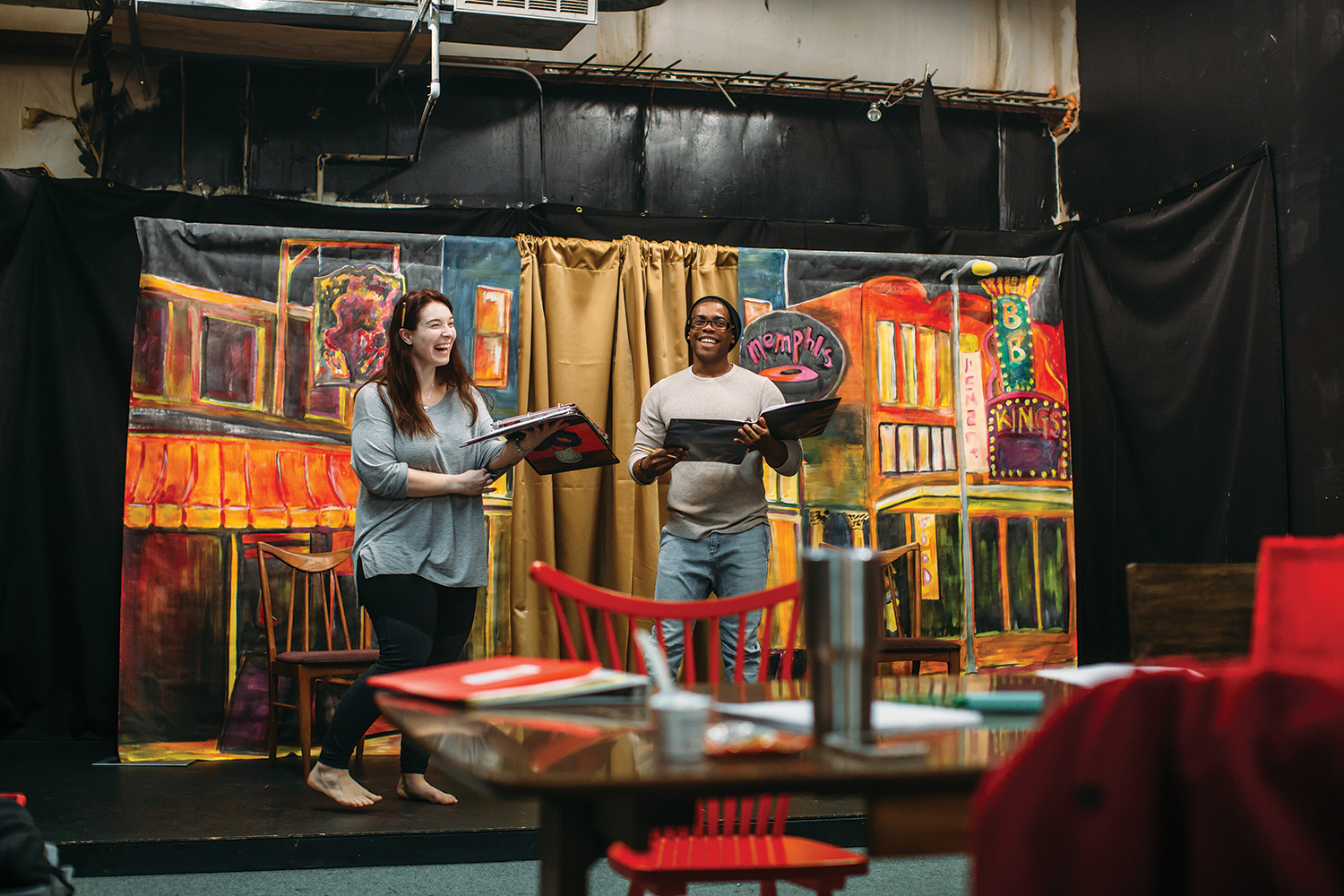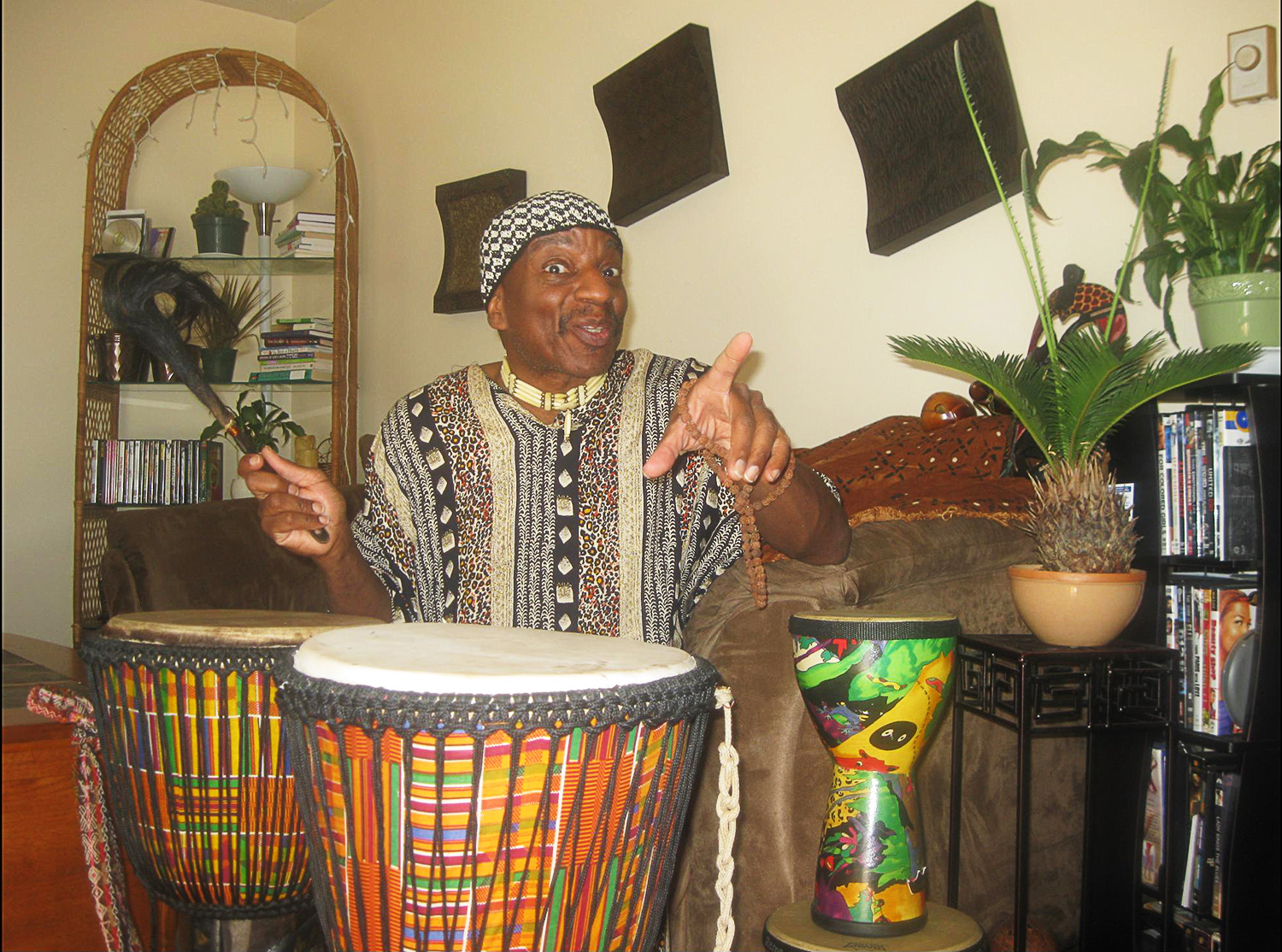
Morgan Carville, left, and Aaron McMillan rehearse Meet Dr. King. In all of Bright Star’s plays, two actors embody all the script’s roles. Aaron plays Martin Luther King, Jr., his father, and a narrator; Morgan is a narrator, a teacher, and Coretta Scott King. Photo by Tim Robison
Starting in 2003, Bright Star Touring Theatre began flipping the script on the rote notion of Black History Month. The company’s plays strive to honor African-American revolutionaries while closely portraying the individuals behind the accomplishments.
In the process, they expanded the black-history portion of their repertoire to three months. The Arden-based theater hires adult actors to present topical touring productions geared toward youth.
Bright Star’s founder and chief executive officer, David Ostergaard, is a prolific playwright and decorated actor who won an Emmy for his role in a commercial for local tech company The Wired Mouse. A graduate of UNC-Greensboro, where he had a double major in theater and history, Ostergaard believes strongly in portraying the drama of yesterday — whether it be the radical electricity of Dr. Martin Luther King, Jr.’s time in Selma, Alabama, or the quiet, culture-changing epiphanies unfolding in George Washington Carver’s Iowa laboratory.

Alexandria Bates plays Mallie, the mother of iconic baseball player Jackie Robinson, in a play named after the famed second baseman. Bright Star Touring Theatre has expanded its scripts for Black History Month to last from January to early March. Photo by Tim Robison
“The essential feeling is that we don’t know history well enough — that much of black history remains untold in K-12 textbooks,” says Josh Batenhorst, the company’s chief operating officer.
After Bright Star’s initial holiday season (Dickens’ A Christmas Carol was the debut production), shows such as Heroes of the Underground Railroad and Let It Shine: The American Civil Rights Movement hit the road. To acknowledge MLK Day, black-history tours now run from January to early March, followed by science dramas in the spring and anti-bullying and literary-themed performances in the fall.
Viewed whole, the playbill is lofty: Bright Star typically stages 50 plays in more than 1,000 individual performances per year — ranging from Struggle for Freedom: The Life of Dr. King (its most requested show) to Bullysaurus Rex to Gus Goes Green: A STEM Adventure — in libraries, schools, museums, and community centers at home in Western North Carolina, in all corners of the U.S., and as far abroad as Russia and Germany. Many actors return to reprise important roles.
This will be Alexandria Bates’ second season playing Mallie, mother of famed second baseman Jack Roosevelt Robinson, the first African-American to play major-league baseball. In one scene in Jackie Robinson, Mallie unpacks the immorality of segregation. She sits youthful Jackie down and explains that he won’t always be treated the same as white people. That struggle will exist, but he must move on, is the message. “‘Don’t feel below anyone, Jackie,’” Bates says, running her lines. “‘One day, you could change the world.’”
The moment is heavy, yet palatable for the suggested K-5 audience. Dramatic valleys such as these are offset with humorous, interactive peaks. Since all Bright Star shows are limited to two actors, it’s necessary that audience members keep the play running during costume changes. Kids get to be extras such as soldiers, or, in this case, baseball spectators who cheer as Jackie rounds the diamond.

“Knowledge is being brought to life,” says director Emily Hubbard, who’s
had a lot of experience in traveling theater and gives actors advice
and encouragement when life on the road gets intense. Photo by Tim Robison
There’s improv, too, says Bates. In one scene, she and her tour partner become Edna and Floyd, an “old, rickety” couple who’ve watched Jackie’s career unfold from the start. Last year, a wardrobe malfunction (glasses misplaced in a prop trunk) belabored the scene transition. To keep packed bleachers of kids from getting antsy, Bates ad-libbed.
“‘I don’t see my glasses, but I do see a dirty diaper,’” Edna bellowed from backstage. The potty humor was perfect for an elementary-school crowd. “They loved it,” says Bates.
Despite it being his first season on the road, Martece Caudle of Maryland has already begun polishing an off-the-cuff persona. His logic? “If you tense up before a car accident, you’re more likely to get hurt,” he says. “Just relax and let it happen.”

In Bright Star’s show George Washington Carver and Friends, one of the touring company’s few shows playing locally, Martece Caudle plays no less than nine icons of the past, including the inventor of the title, Booker T. Washington, and Thurgood Marshall.
This month, Caudle and his tour partner Savannah Strandin will be taking George Washington Carver and Friends to ten states — including a stop in Kansas, at the high school where Carver graduated — then looping their way back to Hendersonville for the final shows in March. The historical sketch follows Dorothy St. Clair, a nine-year-old student writing a report on Carver. In a mystical turn of events, the agronomist (famous for embedding the peanut into American culture) introduces Dorothy to other African-American mavericks: Jackie Robinson, educator Booker T. Washington, Supreme Court Justice Thurgood Marshall, and Madame C.J. Walker (born Sarah Breedlove to parents who had been enslaved, the cosmetics entrepreneur was America’s first self-made female millionaire).
The final scene is the most touching, says Strandin. Carver is applauded not for his scientific endeavors, but for his time spent at Tuskegee Institute, where he taught agriculture to ex-slaves and struggling black farmers. At the end of the play, Carver proclaims, “Teachers are what make the world so remarkable,” and children in the audience are encouraged to wave to their educators. “We hope to make some teachers cry,” Strandin says in jest.
In this show, more so than in Jackie Robinson, the two-actor structure generates the most challenges. Caudle plays all nine historical figures, including the women, meaning he must be onstage for the entire 50 minutes. He also has to develop a distinct personality for each role. “I find a particular rhythm or cadence for each,” he says.
During the weeklong rehearsals in Arden — when actors are expected to arrive “off book,” meaning with lines memorized — director Emily Hubbard helps the performers with character development and blocking. Having toured domestically and at American military bases in Germany, she also imparts wisdom for coping with the nomadism that is showbiz.
First, buy a cooler, says Hubbard. Bright Star bills itself as “America’s most affordable professional touring theatre company,” and to cut down costs on stateside tours, groups are dispatched in minivans.
Twelve-hour drives can be grueling, and stopping for snacks only prolongs the miles. (A lean budget is reflected in their overhead, as well. Just four people complete administrative legwork, and the same sets used 14 years ago are still used today, reveals Batenhorst, a theater-turned-MBA grad.)
And when living out of a suitcase begins to lose its bohemian luster, actors are advised to remember their educational mission. “What you’re doing is inspiring,” says Hubbard. “Knowledge is evolving from the one-dimensional to the 3D: it’s being brought to life.”
Bates, now a veteran of life on the road, adds: “For a moment, you’re a teacher. You’re educating about a dark time in our nation’s past — but these stories give history more humanity.”
Bright Star Touring Theatre hosts local performances in February at schools in Saluda and in Cherokee. On Wednesday, March 8, it presents the closing shows of George Washington Carver and Friends at the Edneyville Library (2 Firehouse Road) at 11am and at the Henderson County Public Library (301 North Washington St.) at 4pm. Free. For more information about the company, see brightstartheatre.com.


